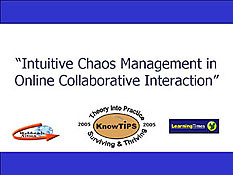Week 2 focused on contrasting and comparing various asynchronous tools, different weblog categories and uses. It started with a great presentation of James Farmer on Monday. Jam session in TappedIn featured Yu Hua Chen ( Changhua City, Taiwan) Dana Watson ( Michigan,USA, ) and Watson Jason Reagin (Suzhou, China ). They started blogging not long ago and shared their personal experience in using blogs in their classrooms.
Dana started blogging to avoid emailing. Stella majored in CALL and blogs were part of her research work. She created her personal linguistic blog and a Taiwanese community blog. She has been blogging since then for about half a year.
Warren adds:
After reading the article "Introducing your students to blogs" in "IATEFL's Issues," by Graham Stanley, I felt that it would be worth looking at blogging further. At the same time I was planning to attend an ELT conference in Beijing, China. The organizers asked if I would consider writing and presenting a paper. I saw the excellent opportunity to do both. I started my own personal/professional blog and then started writing.
Questions:
Why did you start blogging?
What advantages and inconveniences have you three experienced in using blogs until now?
Do you see any cons of using blogs in your classes?
Do you check your students' personal blog?
How do your young learners take to blogs?
Do you integrate blogging in your assessment?
How different is blogging from journal keeping and logging?
In the long run, do the students always maintain interest?
Do you ask your students (young children) to blog at home?
Main points:
Using technology is exciting for learners.
Blogs are a form of publishing. Blogs give the learners confidence and pride in their work. Students can be very motivated at the idea of owning a site on the internet.
People who are shy in class feel more comfortable to express themselves on the blog after class ( lots of teachers are very happy about! ).
Checking students' blogs takes a lot of time especially if you have a big class. Feeback is important and it can be also part of their assignment.
Teachers are experimenting with what works and what doesn't. The idea is to find an activity which makes students active and productive and where they see the benefit or interest of it.
We all suffer from mistake-oriented tradition in teaching which stiffles creativity and voice.
Structuring class assignments is very important.
Some teachers integrate blogging in their assessment.

